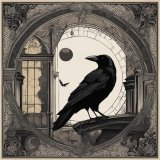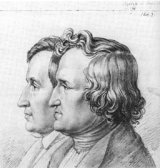The Raven Page #2
"The Raven" by Brothers Grimm is a fairy tale that tells the story of a queen who gives birth to a son that turns into a raven due to a curse. Her son as a raven flies away, but promises to send help to a princess in a dire situation. This tale unfolds with mystery and enchantment, featuring an array of magical elements and creatures, from mysterious riddles, a speaking horse, to a witch's ghost. The narrative examines themes such as love, bravery, and the triumph of goodness.
give myself up to be eaten; if you are wanting food I have enough to satisfy your hunger.’ ‘If that is so,’ replied the giant, ‘I will leave you in peace; I only thought of eating you because I had nothing else.’ So they went indoors together and sat down, and the man brought out the bread, meat, and wine, which although he had eaten and drunk of them, were still unconsumed. The giant was pleased with the good cheer, and ate and drank to his heart’s content. When he had finished his supper the man asked him if he could direct him to the castle of Stromberg. The giant said, ‘I will look on my map; on it are marked all the towns, villages, and houses.’ So he fetched his map, and looked for the castle, but could not find it. ‘Never mind,’ he said, ‘I have larger maps upstairs in the cupboard, we will look on those,’ but they searched in vain, for the castle was not marked even on these. The man now thought he should like to continue his journey, but the giant begged him to remain for a day or two longer until the return of his brother, who was away in search of provisions. When the brother came home, they asked him about the castle of Stromberg, and he told them he would look on his own maps as soon as he had eaten and appeased his hunger. Accordingly, when he had finished his supper, they all went up together to his room and looked through his maps, but the castle was not to be found. Then he fetched other older maps, and they went on looking for the castle until at last they found it, but it was many thousand miles away. ‘How shall I be able to get there?’ asked the man. ‘I have two hours to spare,’ said the giant, ‘and I will carry you into the neighbourhood of the castle; I must then return to look after the child who is in our care.’ The giant, thereupon, carried the man to within about a hundred leagues of the castle, where he left him, saying, ‘You will be able to walk the remainder of the way yourself.’ The man journeyed on day and night till he reached the golden castle of Stromberg. He found it situated, however, on a glass mountain, and looking up from the foot he saw the enchanted maiden drive round her castle and then go inside. He was overjoyed to see her, and longed to get to the top of the mountain, but the sides were so slippery that every time he attempted to climb he fell back again. When he saw that it was impossible to reach her, he was greatly grieved, and said to himself, ‘I will remain here and wait for her,’ so he built himself a little hut, and there he sat and watched for a whole year, and every day he saw the king’s daughter driving round her castle, but still was unable to get nearer to her. Looking out from his hut one day he saw three robbers fighting and he called out to them, ‘God be with you.’ They stopped when they heard the call, but looking round and seeing nobody, they went on again with their fighting, which now became more furious. ‘God be with you,’ he cried again, and again they paused and looked about, but seeing no one went back to their fighting. A third time he called out, ‘God be with you,’ and then thinking he should like to know the cause of dispute between the three men, he went out and asked them why they were fighting so angrily with one another. One of them said that he had found a stick, and that he had but to strike it against any door through which he wished to pass, and it immediately flew open. Another told him that he had found a cloak which rendered its wearer invisible; and the third had caught a horse which would carry its rider over any obstacle, and even up the glass mountain. They had been unable to decide whether they would keep together and have the things in common, or whether they would separate. On hearing this, the man said, ‘I will give you something in exchange for those three things; not money, for that I have not got, but something that is of far more value. I must first, however, prove whether all you have told me about your three things is true.’ The robbers, therefore, made him get on the horse, and handed him the stick and the cloak, and when he had put this round him he was no longer visible. Then he fell upon them with the stick and beat them one after another, crying, ‘There, you idle vagabonds, you have got what you deserve; are you satisfied now!’ After this he rode up the glass mountain. When he reached the gate of the castle, he found it closed, but he gave it a blow with his stick, and it flew wide open at once and he passed through. He mounted the steps and entered the room where the maiden was sitting, with a golden goblet full of wine in front of her. She could not see him for he still wore his cloak. He took the ring which she had given him off his finger, and threw it into the goblet, so that it rang as it touched the bottom. ‘That is my own ring,’ she exclaimed, ‘and if that is so the man must also be here who is coming to set me free.’ She sought for him about the castle, but could find him nowhere. Meanwhile he had gone outside again and mounted his horse and thrown off the cloak. When therefore she came to the castle gate she saw him, and cried aloud for joy. Then he dismounted and took her in his arms; and she kissed him, and said, ‘Now you have indeed set me free, and tomorrow we will celebrate our marriage.’
Translation
Translate and read this book in other languages:
Select another language:
- - Select -
- 简体中文 (Chinese - Simplified)
- 繁體中文 (Chinese - Traditional)
- Español (Spanish)
- Esperanto (Esperanto)
- 日本語 (Japanese)
- Português (Portuguese)
- Deutsch (German)
- العربية (Arabic)
- Français (French)
- Русский (Russian)
- ಕನ್ನಡ (Kannada)
- 한국어 (Korean)
- עברית (Hebrew)
- Gaeilge (Irish)
- Українська (Ukrainian)
- اردو (Urdu)
- Magyar (Hungarian)
- मानक हिन्दी (Hindi)
- Indonesia (Indonesian)
- Italiano (Italian)
- தமிழ் (Tamil)
- Türkçe (Turkish)
- తెలుగు (Telugu)
- ภาษาไทย (Thai)
- Tiếng Việt (Vietnamese)
- Čeština (Czech)
- Polski (Polish)
- Bahasa Indonesia (Indonesian)
- Românește (Romanian)
- Nederlands (Dutch)
- Ελληνικά (Greek)
- Latinum (Latin)
- Svenska (Swedish)
- Dansk (Danish)
- Suomi (Finnish)
- فارسی (Persian)
- ייִדיש (Yiddish)
- հայերեն (Armenian)
- Norsk (Norwegian)
- English (English)
Citation
Use the citation below to add this book to your bibliography:
Style:MLAChicagoAPA
"The Raven Books." Literature.com. STANDS4 LLC, 2025. Web. 15 Jan. 2025. <https://www.literature.com/book/the_raven_2116>.




Discuss this The Raven book with the community:
Report Comment
We're doing our best to make sure our content is useful, accurate and safe.
If by any chance you spot an inappropriate comment while navigating through our website please use this form to let us know, and we'll take care of it shortly.
Attachment
You need to be logged in to favorite.
Log In